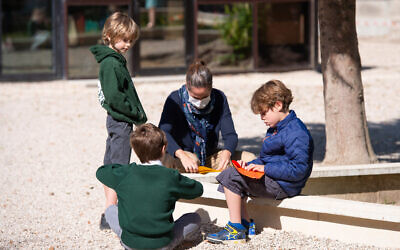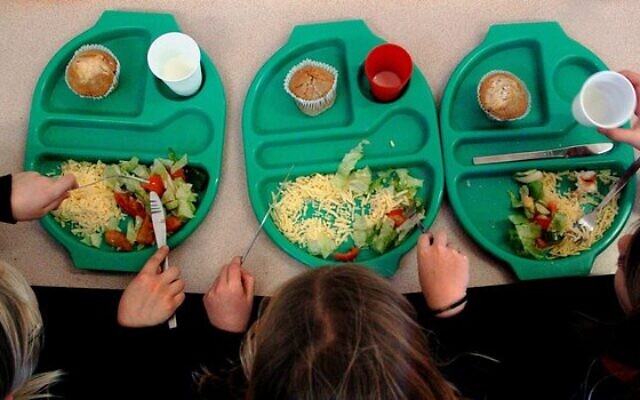SPECIAL REPORT: Jewish school meals crisis as kosher food inflation up 30%
Two Jewish secondary schools won't provide kosher meals to students from the end of October, as the cost of living crisis hits the school meal industry.
UK Jewish schools are finding it harder to provide student meals and cover energy prices due to the rising cost of living crisis. At least two Jewish secondary schools in north-west London will stop providing kosher meals to students from the end of October, asking parents to send in packed lunches.
One figure responsible for providing kosher catering to almost 20 schools across north-west London and Essex described the situation as an “economic pandemic”, estimating the price of an average kosher school meal has risen by 30 percent in real terms due to food, fuel and energy inflation. He noted menus at many Jewish schools have changed, with a significant reduction in the use of meat and expensive ingredients like sunflower oil.
Meanwhile, a leading figure in Stamford Hill’s Orthodox Jewish community said teachers have started to bring in food for young students to prevent them going hungry as parents struggle to pay for a catered school meal or send in a packed lunch due to rising living costs.
Food inflation nationally is running at more than 12 percent, so add in the kosher element, and it is up to a 30 percent rise
Last week, Jewish News revealed a letter sent to parents and carers of students at Hasmonean High School for Boys and Hasmonean High School for Girls read: “Rising supply costs have meant that it is no longer financially viable for [our catering supplier] to continue supplying our schools.
“As a result, effective as of 28 October 2022, there will be no food supplied to both schools for either the morning or lunch breaks.
“Despite our extensive research into locating a replacement caterer, this has been unsuccessful and unfortunately, this will mean that all students will be required to bring in a packed lunch daily going forward, and a snack for break time if they would like to. All food and drink brought into the school must of course be kosher.”
Last week, Jewish News revealed a letter sent to parents and carers of students at Hasmonean High School for Boys and Hasmonean High School for Girls read: “Rising supply costs have meant that it is no longer financially viable for [our catering supplier] to continue supplying our schools.
It added: “We will be sending out information regarding students who receive free school meals over the next few weeks so that they continue to receive what they are entitled to.”
Paul Robottom, founder and director of Signature Dining, confirmed that his company would no longer supply meals to the Hasmonean secondary schools.
Mr Robottom, who supplies 18 Jewish primary and secondary schools with kosher meals, said the impact of rising prices on his industry was an “economic pandemic”.
The businessman, who has provided Jewish institutions including care homes with kosher meals for the past 20 years, said that without more support from the government and parents, the industry would go bust.
He has raised prices by 10.5 percent this month to cope with increasing costs. His company’s average secondary school meal, which includes a main course and a dessert, is now £3.27 per child per day.

“Everyone is being squeezed,” he said. “It is hugely impacting us. It is a new pandemic, an economic pandemic, and it will only get worse. Food inflation nationally is running at more than 12 percent, so add in the kosher element, and it is up to a 30 percent rise,” he added, noting extra costs including kosher ingredients, licensing and shomer fees.
“The cost of ingredients has risen, the cost of running a production kitchen with fuel has risen and so has the petrol we have to factor in when we deliver food to the schools. A kosher meal might now cost us an extra 30 per cent, but no one would be able to afford our school meals if we passed on the whole amount.”
He confirmed school menus had been changed to mitigate the impact: “We have remanufactured them. We still provide the right choices as per legal requirements and guidelines, but we have had to limit some choice.
“For example, two days a week we don’t provide meat, whereas we used to offer it five days a week. We also used a lot more red meat, but now it’s only one day a week. We offer more vegetarian meals with protein like pulses and tofu or a vegetarian bake.”
Calling for more government support for faith schools and businesses, he predicted prices would rise further.

“I do not think the government has grasped the enormity of what is happening. Anyone in the business of ‘getting food on plates’ will be struggling,” he said. “The allowance from the government does not take into account the extra kashut needs of a Jewish faith school.”
The government currently provides £2.41 for all children from Reception to Year 2 as part of the “universal infant free school meals” programme. Beyond this, children at state-aided schools may also qualify for free school meals.
However, Raisel Freedman, the assistant director at PaJes, which supports Jewish schools across the UK, said not all parents are applying for this extra support – even if they are eligible. PaJes has donated £280,000 in food vouchers for people who are eligible for free school meals.
Ms Freedman said: “There is unfortunately still a stigma around registering for free school meals in the Jewish community, even when the parents really need it.
“Some just don’t want people to know that they are struggling and so will rely on charitable donations for support but won’t officially register their eligibility for free school meals.”
On the impact of the crisis, she added: “Jewish schools are challenged financially. On top of the national increase of things like the cost of food rising and the rising costs of delivery and sourcing of food, Jewish schools also have to factor in kashrut costs for meals. Many schools nationally struggle to cover their costs based solely on the government funding in this area and our Jewish schools even more so.”
The biggest issue facing Jewish schools was rising energy costs, she went on. “This is the biggest concern. We hope the support due to be announced later this month will be substantial enough to cover the increase in these areas.”
Spencer Lewis, executive headteacher of Yavneh College secondary school in Hertfordshire, also commented on the impact of rising costs. He said: “Energy costs are a concern but we continue to keep a close eye on prices through the company who have been negotiating our energy contracts for many years.”
Meanwhile Bill Pratt, the headmaster at the fee-paying Naima Jewish Preparatory School in Maida Vale, said he recognised the institution would need to rely on its savings in the face of rising prices.
He said: “Undoubtedly [the crisis] will hit some families – and especially staff – in travel, accommodation and other connected costs. We are fortunate to have reserves and will have to pay the bills. It is unlikely, as a private school, that we will receive any additional help.”
Meanwhile Motty Pinter from The Interlink Foundation, the umbrella organisation for the UK’s Orthodox Jewish charitable sector, said the rising cost of living was impacting Charedi families – especially the majority who send their children to independent schools, which do not receive free school meal funding.
“Of course, it got a lot worse recently,” said Mr Pinter, who called for free school meals to be provided at independent schools. “All disadvantaged children from poor homes should be receiving a free school meal every day, regardless of the setting they attend.”
He pointed out while some independent Charedi schools ask parents to send their children in with a packed lunch, others do provide hot meals for around £500 per child, per year. But with Interlink estimating that the average Charedi family is made up of 6.3 people, this is unaffordable for many.
One teacher at an Orthodox Jewish school in Stamford Hill, who wished to remain anonymous, said she had noticed an increase in the number of children who were being sent to school without any lunch.
On one occasion she contacted the mother of a child who had been sent in with only a small snack. The teacher recalled: “The mother told me she could give the child breakfast and dinner but was finding it hard to find the money to pay for lunch as well.
“I had to go out and buy the child something, and now I bring extra food to ensure these children don’t go hungry. It’s heartbreaking.”

Thank you for helping to make Jewish News the leading source of news and opinion for the UK Jewish community. Today we're asking for your invaluable help to continue putting our community first in everything we do.
For as little as £5 a month you can help sustain the vital work we do in celebrating and standing up for Jewish life in Britain.
Jewish News holds our community together and keeps us connected. Like a synagogue, it’s where people turn to feel part of something bigger. It also proudly shows the rest of Britain the vibrancy and rich culture of modern Jewish life.
You can make a quick and easy one-off or monthly contribution of £5, £10, £20 or any other sum you’re comfortable with.
100% of your donation will help us continue celebrating our community, in all its dynamic diversity...
Engaging
Being a community platform means so much more than producing a newspaper and website. One of our proudest roles is media partnering with our invaluable charities to amplify the outstanding work they do to help us all.
Celebrating
There’s no shortage of oys in the world but Jewish News takes every opportunity to celebrate the joys too, through projects like Night of Heroes, 40 Under 40 and other compelling countdowns that make the community kvell with pride.
Pioneering
In the first collaboration between media outlets from different faiths, Jewish News worked with British Muslim TV and Church Times to produce a list of young activists leading the way on interfaith understanding.
Campaigning
Royal Mail issued a stamp honouring Holocaust hero Sir Nicholas Winton after a Jewish News campaign attracted more than 100,000 backers. Jewish Newsalso produces special editions of the paper highlighting pressing issues including mental health and Holocaust remembrance.
Easy access
In an age when news is readily accessible, Jewish News provides high-quality content free online and offline, removing any financial barriers to connecting people.
Voice of our community to wider society
The Jewish News team regularly appears on TV, radio and on the pages of the national press to comment on stories about the Jewish community. Easy access to the paper on the streets of London also means Jewish News provides an invaluable window into the community for the country at large.
We hope you agree all this is worth preserving.






















